Photographs: Ajay Verma/Reuters Subhadip Sircar and Swati Bhat
For all the worries among investors and policymakers over the rupee's sudden plunge to record lows, the Indian economy is in better shape to handle a depreciation than it was when the currency last hit the buffers a year ago.
Inflation is falling, lower oil and gold prices are helping narrow a current account deficit that likely reached 5.1 percent of gross national product last fiscal year. And exports, particularly by software services sector companies like Infosys Ltd, should benefit from the weaker rupee.
The rupee has fallen more than 8 percent since the beginning of May, and although that is the worst performance in Asia, other currencies are also being hit by the broad rally in the dollar. Last year the rupee was largely falling alone.
"Certainly we are not happy with it, but we certainly are not unduly worried," Arvind Mayaram, Economics Affairs Secretary at the Ministry of Finance, said.
…
India unhappy, but unshaken by Rupee's plunge
Photographs: Nguyen Huy Kham/Reuters.
"This is a temporary phase," Mayaram said, adding that the government expected foreign buying of bonds to emerge in coming days that could lift the rupee.
Worried or not, it took suspected central bank intervention to pull the rupee off a record low of 58.98 per dollar on Tuesday.
It is a sensitive time for Prime Minister Manmohan Singh's minority coalition, with important state votes due before a national election next year.
The ministry's chief economic adviser, Raghuram Rajan, said Indian authorities, including the central bank, the market regulator and government, were ready to act if needed to stop a runaway currency market.
Rajan argued that the extent of the rupee's slide had taken it into undervalued territory. On a trade-weighted basis, however, the rupee is fairly valued to slightly over-valued. In real effective exchange rate (REER) terms, the rupee was at 105.74 in May against six of its key trading partners, above the 100 that denotes fair value.
…
India unhappy, but unshaken by Rupee's plunge
Image: A worker stamps balls before they are packed at a factory in Meerut.Photographs: Parivartan Sharma/Reuters
Though the economy remains sluggish, with weak investment and consumption and the government controlling spending, it is still doing better than a year ago, when credit rating agencies Standard & Poor's and Fitch threatened to relegate India to "junk" bond status.
The slowdown that resulted in decade-low growth of 5 percent in the fiscal year that ended in March appears to have bottomed out, helped in part by some modest RBI interest rate cuts and the government's reforms aimed at boosting capital inflows.
Mayaram said strengthening economic fundamentals, as well as policy measures, should persuade the market to revise its short-term view.
The government this month took steps to curb imports by raising duties, while the central bank clamped down on gold financing, largely after the trade deficit surged in April driven by higher demand for cheaper gold.
…
India unhappy, but unshaken by Rupee's plunge
Photographs: Reuters
"The current account deficit is certainly bothersome," Mayaram said, though adding recent government steps to curb gold imports had "started showing results".
A weaker rupee should curb demand for gold imports, which make up 11 percent of India's import bills. That would have a potentially big impact given India is the world's biggest importer of gold.
Oil prices have also fallen, with Brent crude down 6.7 percent so far this year, making the impact from a weakerrupee easier to sustain.
Before the rupee's fall accelerated in the past few days, analysts had appeared unalarmed by the rupee's decline and were expecting a recovery.
A Reuters poll last week suggested the market had expected the rupee to strengthen to 56.50 to the dollar in a month, and gradually improve to 53.78 in over twelve months.
Mayaram stressed other emerging market currencies were in the same boat, citing an 11 percent fall in the South African rand.
…
India unhappy, but unshaken by Rupee's plunge
Photographs: Reuters
In the year so far, the rupee has weakened slightly more than 5 per cent. Within emerging Asia, only the South Korean won has done as badly.
The Philippine peso and the Brazilian real have also been weakening.
Last year, in contrast, only the Indonesian rupiah and the rupee declined against the dollar in emerging Asia.
Deutsche Bank, in a June 7 note, said it was not particularly worried about the near or medium-term outlook for the rupee.
"The economy's outlook is weak, however, and the currency will remain vulnerable to periodic policy setback and global factors," Deutsche said.
"But the major sources of drag to the currency in recent years, high inflation and high current account deficit, are dissipating rapidly, and will help support the currency."
(Additional reporting by Manoj Kumar in New Delhi; Editing by Rafael Nam and Simon Cameron-Moore)

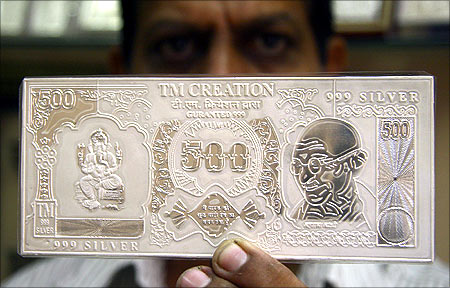
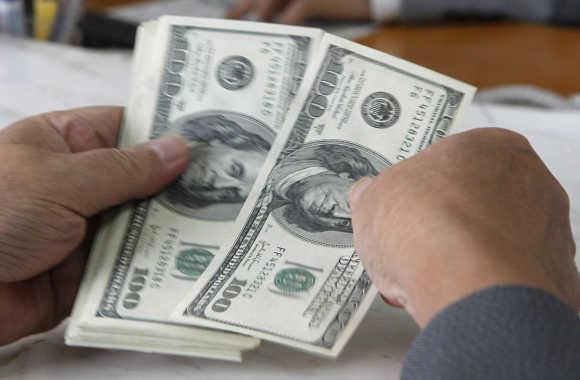
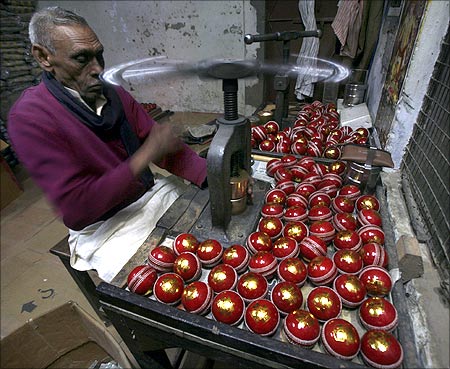
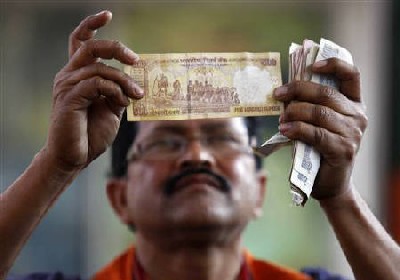
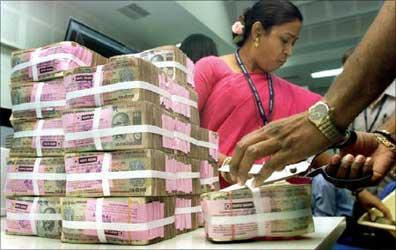

article